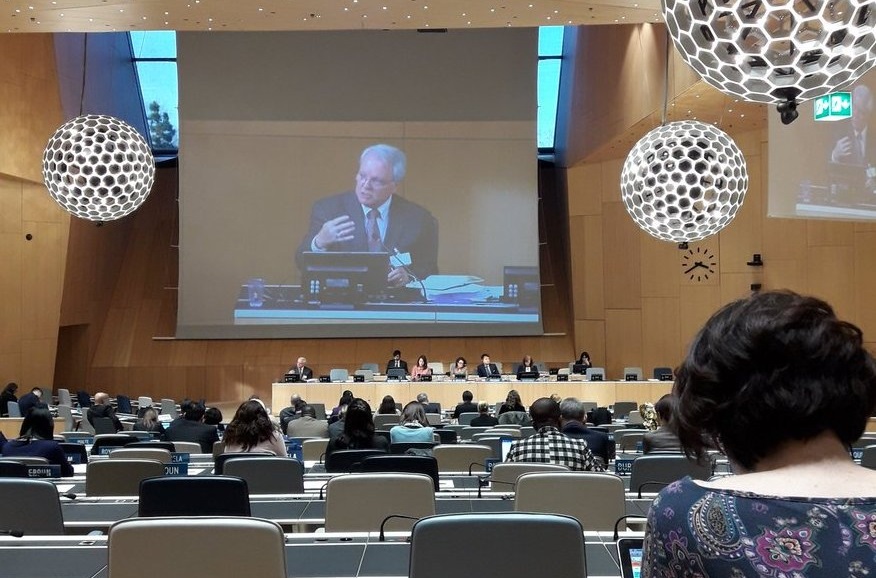
Teresa Hackett, EIFL Copyright and Libraries Programme Manager, reports on a busy week advocating for libraries at the World Intellectual Property Organization’s (WIPO) Standing Committee on Copyright and Related Rights (SCCR/35) which met in Geneva from 13-17 November 2017.
WIPO’s Standing Committee on Copyright and Related Rights (SCCR), that meets twice a year in Geneva, featured six eminent professors who gave presentations on topics currently under discussion by the committee.
While a draft action plan on limitations and exceptions for the 2018-19 biennium was not adopted, progress was made and it will be considered at the next session in 2018.
PRESENTATIONS BY SIX PROFESSORS
The presentations concerned the topics limitations and exceptions, copyright in the digital environment, and artist’s resale right (that gives visual artists the right to a royalty payment when their works are resold on the market).
On limitations and exceptions, Professor Kenneth Crews presented an updated version of the Study on Copyright Limitations and Exceptions for Libraries and Archives (2017), Professor Daniel Seng presented an updated analysis on limitations and exceptions for educational activities, and Professors Caroline Ncube and Blake Reid outlined a scoping study on access by persons with disabilities.
On copyright in the digital environment, there were two presentations. Professor Jane Ginsburg held a question and answer session (by Skype) on a brainstorming exercise convened by WIPO in April 2017 to examine the impact of digital technologies on national legal frameworks, and Ms Guilda Rostama Ph.D presented a scoping study on copyright legislation adopted by WIPO member states between 2006 and 2016.
On artist’s resale right, Professor Joelle Jarchy presented a study on the Economic Implications of The Artist’s Resale Right, co-authored with Professor Kathryn Graddy.
Over two-and-a-half days, Member states and observer groups, such as EIFL, participated in an active Q&A session with the professors (from the morning of Wednesday 15 November, available to watch online).
UPDATED STUDY ON LIBRARIES AND ARCHIVES - NEW LEGISLATION ADDRESSING OLD ISSUES
“The reality is that digital technology is probably unavoidable” - Prof Crews
The updated study on limitations and exceptions for libraries and archives (2017) reveals that while over a quarter of the laws that apply to libraries and archives have changed since 2015, they are still mostly addressing the same subject areas of the old legislation, such as copies for preservation and research and study. In other words, relatively few countries are taking on important new areas of concern such as the application of digital technologies, uses of orphan works by libraries, cross-border communications, and the relationship to licences and contract waivers for access to digital resources.
In his presentation, Professor Kenneth Crews, provided three examples of recently enacted copyright laws by WIPO member states (without naming names) concerning libraries and archives.
Country number one has an entirely new copyright act with simple provisions on copies for research and copies to replace works that have, for example, been lost, damaged or that have deteriorated. However the provisions are limited to published research works only, and are explicitly limited to making paper copies.
Country number two also has an entirely new copyright act with a library exception that is principally about the making of copies for preservation and research, although it allows for a bit more. However, the law is extremely complex with multiple restrictions on the format in which the copy may be made (some uses are limited to paper copies) and there are also restrictions on keeping and using digital files.
Country number three was highlighted by Prof Crews as being unusual for embracing new areas. This country replaced its existing library exceptions with new provisions (showing that modern uses can be catered for without the introduction of a whole new law). The new provisions briefly set out an expanded range of services offered by libraries that apply fully to digital technologies, and an expanded scope of works. There are also additional new provisions on data mining, waivers by contract, orphan works, and more.
Overall, Prof Crews noted that there is relatively little innovation in scope and language in library statutes, a strongly uneven application of digital technologies to library activities, and a high degree of disharmony among the statutes of different countries around the world.
He also observed the continued influence of multinational models and agreements that are shaping legislative developments e.g. European Union (EU) provisions on the making available of a digital work on the premises of the library (the so-called dedicated terminals provision) has been replicated in 14 countries outside the EU.
Prof Crews’ new data and trend analysis illustrates three important points.
First, brand new laws are not providing for current technologies that are widely used by libraries, students, educators and citizens everywhere.
Second, there is a growing inequality in the means to legally access knowledge that will only serve to drive people towards unauthorized sources.
Third, WIPO urgently needs to take a leadership role in setting firm international standards for use of copyrighted works by libraries not only for the sake of access to knowledge, but also for the future credibility of the copyright system.
FOCUS ON EDUCATION
Professor Daniel Seng presented an updated study on limitations and exceptions for educational activities (2017) that analyzed a number of further areas requested by member states at SCCR/33.
The updated study, that features all 191 WIPO member states, examined among other issues the scope of digital copying within the framework of the Berne Appendix - special provisions for developing countries to reproduce works under certain conditions (Prof Seng found that digital reproduction does apply, and digital dissemination may need re-visiting if it is to apply unambiguously); limitation on liability for educational institutions (only four countries currently limit liability); the application of provisions that limit the scope of contracts to override copyright exceptions (currently 15 countries, this subject is recommended for further exploration as it appears to be part of a move by legislators to protect exceptions).
In addition, a lunch-time event ‘Copyright & Education in the Digital Environment: Challenges and Opportunities’, sponsored by the government of Brazil and the American University Washington College of Law Program in Information Justice and Intellectual Property (PIJIP), attracted almost 100 participants. Chaired by Daniel Pinto, Brazilian Ministry of Foreign Relations, practitioners from education, libraries and publishing discussed how the evolution of digital technologies has affected the distribution of educational materials, and what role WIPO might play in resolving some of the challenges. Read more about the side event on education.
CALL FOR SOCIAL LEGITIMACY IN COPYRIGHT
The need for social legitimacy and common sense copyright laws to ensure the future vitality of the copyright system was raised several times during the week.
Prof Allan Rocha, Federal University Rio De Janeiro, a panellist at the lunch-time event on education, described how the law must reflect the dynamics of today’s teaching practices. “Society won’t wait for the law to be developed”, said Prof Rocha. “In many countries, copyright is already seen as something to dislike, not something to praise with the unfortunate effect of creating a generation of users that have no respect for the law,” he continued.
In an intervention on limitations and exceptions, the representative of the Society of American Archivists (SAA) said that ignoring the law, however, is not the answer. But archivists do not want to be in the position in which WIPO’s failure to act [to create a global approach that transcends barriers to culture and knowledge], leaves their daily work as an advertisement that copyright is irrelevant, and a dysfunctional artifact of a bygone era.
To respond to such challenges, Prof Crews advised legislators to be pragmatic and to create copyright laws that give honest citizens good, honest standards that they can understand and apply effectively. There is a common desire among all stakeholders to respect the work of libraries, authors, publishers and everyone in the copyright equation; there is no desire among libraries and archives to see digital files misused or abused. With reasonable safeguards, it should be possible to work together to allow appropriate technologies to move forward for everyone’s benefit, Prof Crews noted.
CALL FOR EXCEPTIONS IN THE DRAFT BROADCAST TREATY
On the draft treaty for the protection of broadcast organizations, EIFL called for limitations and exceptions in the negotiating text to be strengthened in order to ensure fair access to broadcast content in libraries for social, educational and public interest reasons. It is also important to ensure that any new rights do not extend to content that is in the public domain, to content that is licensed under an open content licence, or that was never intended to be subject to very long terms of protection.
PROGRESS ON DRAFT ACTION PLAN
At its previous session in May 2017 (SCCR/34), member states requested the Secretariat to draw up a draft action plan on limitations and exceptions for the biennium 2018-2019 for consideration at SCCR/35.
All members agreed that the draft action plan prepared by the Secretariat was a good basis for making progress on all the issues: libraries, archives, museums and disabilities not covered by the Marrakesh Treaty for blind and visually impaired people. Following discussion on elements of the draft plan, member states requested the Chair to circulate a revised plan in advance of SCCR/36 (i.e. by 28 April 2018).
An action plan is important to give the Committee direction on its future work, as well as helping library groups prepare for their work ahead. We hope that a favourable plan can be adopted at the next session, it’s time for action!
FIND OUT MORE
- Standing Committee on Copyright and Related Rights Thirty-Fifth Session: Meeting documents
- WIPO two minute summary of SCCR/35
- Statements by EIFL at SCCR/35 - Agenda item 5: Protection of broadcasting organizations; Agenda item 6: Limitations and exceptions for libraries and archives; Agenda item 7: Limitations and exceptions for libraries and archives
- Video on demand SCCR/35. From the dropdown list, select Standing Committee on Copyright and Related Rights: Thirty-Fifth session
- Twitter hashtag #sccr35
- WIPO SCCR/35 photo album on Flickr
- Why EIFL is advocating for an international treaty for libraries and archives.
SHARE / PRINT








